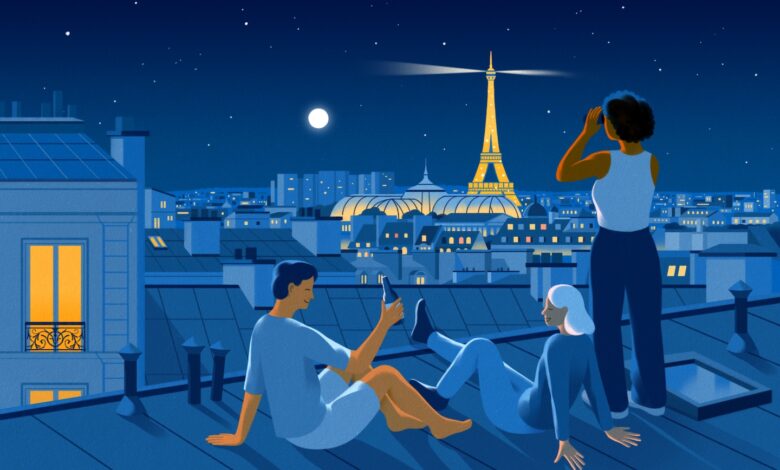To avoid European travel’s crowds and heat, seize the night

[ad_1]
In the early evening, the last ferry departs, signaling a changing of the guard. The day-trippers are gone, and the overnight guests start emerging from their self-imposed isolation. They reclaim Capri, at least for the night.
If you come in the evening, you’ll see a completely different island, residents say. One that’s more chic and relaxed, with more gowns and hair down.
It’s another gangbusters season for European travel, and the usual suspects are dealing with the usual headaches: baking heat and swarms of tourists. If you’re going to the most popular parts of the continent — Italy, France, Greece, Spain — you’re bound to end up feeling hot and cramped during some part of your trip. But you can dodge some of that discomfort and jet lag at the same time, by shifting your daily schedule.
No, not earlier. Much later.
Here’s how to embrace being a night owl in Europe.
Temperatures begin to climb rapidly during the busiest times at the Acropolis, 9 a.m. to 12 p.m., said Ioannis Giannakakis, CEO and co-founder of Athens Walking Tours. Because the Greek treasure is open between sunrise and sunset, he recommends going before that peak period, or closer to closing as the heat begins to drop.
For those scorching hours to kill in the afternoon, “do nothing,” Giannakakis said. “Have some drinks, sit by the pool, take a nap.” You’ll avoid the hottest parts of the day, plus much of the crowds, and prepare for your evening activities.
Dodge the cruise-ship crowd
In cities that get flooded with cruise crowds, there is a predictable rhythm to the influx. Usually, cruise travelers disembark in the morning, explore all day, then must report back to the ship by the early evening. If you time your sightseeing around this exodus, “you will avoid more people,” longtime Dubrovnik tour guide Ivan Vukovic said.
The same is true of places that attract a day-tripper crowd that needs to catch a ferry to their home base. You’ll see the phenomenon across Italy’s islands, like the aforementioned Capri, Ischia and Ponza, said Simone Amorico, CEO of the private tour operator Access Italy.
Sightsee at the end of the day …
Near closing time, when the typical tourist is starting to think about happy hour or dinner plans, popular sightseeing spots thin out. “That’s why I always recommend visiting major sights in the afternoon,” said Sandra Weinacht, who co-owns the tour company Inside Travel Experiences.
There are caveats to this tip. Going closer to closing means you’ll have less time to enjoy a place. Alternatively, you can look for sites that stay open late.
Paris’s most popular museum, the Louvre, doesn’t close until 9 p.m. on Wednesdays and Fridays, and it offers tours on Fridays at 6 p.m. and 7 p.m. The Yves Saint Laurent museum stays open until 9 p.m. on Thursdays. In Rome, tour guide and author Katie Parla said, both the Colosseum and the Roman Forum are amazing to admire at night from outside; the latter is open until 7:15 p.m.
… or visit sites after hours
Private guides and organized tours can open doors after hours, too, for a fee.
You can find night tours of the Colosseum that can be more expensive than a daytime option, around $100 per person. Privatizing the Louvre for a visit, on the other hand, requires a “donation” of at least 30,000 euros. Weinacht and Access Italy can organize private visits for higher-end clients to peak-crowded places like the Vatican Museums. Giannakakis said you can do a VIP tour of the Acropolis after 8 p.m., but it will set you back about 5,000 euros for a group of up to five people.
Look for unique evening experiences
Many popular tourist destinations offer special evening programs over the summer that can make a night visit more appealing, even if you’re not going for a traditional tour.
At the Chateau of Versailles, the palace hosts nighttime fountain shows, complete with fireworks, that run until nearly midnight every Saturday, plus a few other special dates. In Rome, Parla recommends seeing an opera performance at the Baths of Caracalla, the site of the city’s second-largest Roman public baths, dating to A.D. 200s.
Americans and Europeans diverge on dinnertime preferences. Embrace the European ethos and lean late.
In Paris, “if you are willing to eat at 9 or 9:30, it’s easier to get a good reservation, and you’ll be surrounded by locals,” said Meg Zimbeck, who runs the food tour company and review site Paris by Mouth.
Croatians “don’t eat before 9 p.m.,” Vukovic said. He recommends booking a table for at least that time, if not later, and then enjoying the country’s nightlife, as bars stay open until 2 a.m. and nightclubs till 5 a.m.
In Greece, whether you’re in a bustling city or on a quaint island, Giannakakis said locals wait until at least the sun sets for more comfortable alfresco dining. To accommodate that schedule, it’s not uncommon for kitchens to stay open until midnight.
Italians prefer eating around 9 p.m., Amorico said, with many restaurants offering a last seating around 9 or 9:30 p.m. If you want to sit down after 10 p.m. with a local crowd, stick to wine bars and gastropubs. Pizzerias also serve until 11 p.m. or midnight.
Know when going out late is less effective
Staying up late isn’t a foolproof way to avoid all crowds. In destinations with less cruise traffic, more overnight guests and nocturnal locals, you may still encounter a bustling scene well into the night. Amorico said that’s true of Rome, where he prefers sticking to early-morning exploring. If you hit the churches when they open at 8 a.m., you’ll find them empty, he said.
Weinacht added that another way to avoid cruise traffic was just to stick to local neighborhoods over tourist hot spots. In Rome, for example, Prati is much quieter than the Vatican area next door. In Barcelona, staying around Eixample will be a calmer experience than Las Ramblas, no matter what time of day.
[ad_2]
Source link




